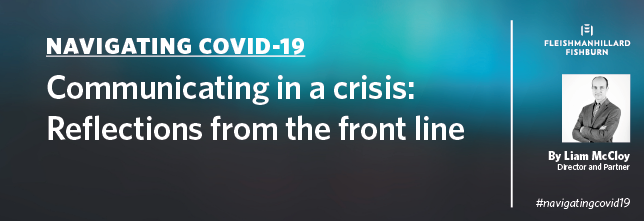Communicating in a crisis: Reflections from the front line

Communicating in a crisis: Reflections from the Front line By Liam McCloy, Director and Partner
Almost 60 years ago JFK said, “Ask not what your country can do for you – ask what you can do for your country.” His words will resonate for many of the general public currently in lockdown, but for those running businesses the situation is more complex. Many companies who shut their doors to protect their workforce are still struggling in practice to access Government funds offered in principle. Many companies who continue to lawfully and safely operate are accused of being ‘non-essential’ and placing their employees at risk by simply asking them to come into work. And many companies are being asked to suspend time critical business decisions and investments because the Government is not yet in a position to chart the short to medium term impact on the economy. We appreciate how unsettling this is for all involved.
Given the ongoing uncertainty, business has to carefully calibrate its communications with Government around the following core topics:
Choose your battles
No one can doubt the scale of financial support the Government has made available to business and the nation’s workforce, but the devil is in the detail. There have been real challenges in accessing those funds in a timely manner and business and their trade associations must strike a balance between campaigning in public for funds previously pledged, versus working in private to expedite access to them. The monthly pay cycle will be a crunch moment for many businesses trying to stay afloat during the current lockdown period and external communications should be mindful of these key moments to press their case accordingly.
Place the workforce and frontline first
We know from recent FHF research into the COVID-19 crisis that consumers and employees feel more loyal to companies who are looking after their workforce to the best of their abilities and have done their bit to help those working to support the frontline and those most vulnerable in our local communities. But now is not the time to take public credit for this or expect politicians to slap you on the back. Everyday people are the real heroes of the COVID-19 crisis – not brands, and stakeholder communications should be mindful of this.
Pace and shape the recovery
We also know from the same FHF research that nearly half of employees currently want the changes businesses have made in support of their workforce to remain permanent. There may be many other reforms that, if continued, will have profound implications for how business supply chains and wider trading partnerships operate. With other countries already looking at how best to re-start their economies, we can help you evaluate what impact COVID-19 has had on some of the long-held rights and responsibilities enjoyed by business and what this might mean for new regulations and restrictions that might impact your corporate reputation and licence to operate.
This article forms part of a wider collection entitled ‘What next for public affairs in a post-COVID world?’ from FleishmanHillard Fishburn’s award-winning public affairs team.
Find Out More
-
Platinum CMS Award
March 13, 2024
-
Changing Communications Tack at Mobile World Congress
February 21, 2024


